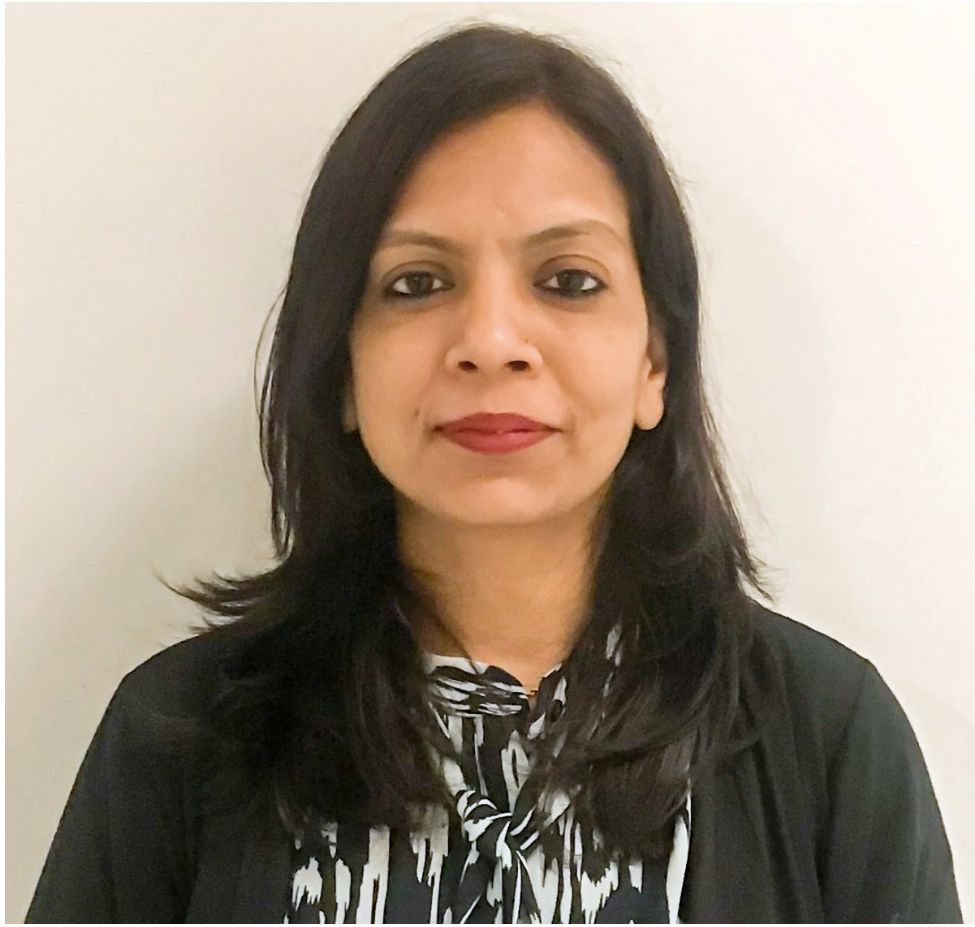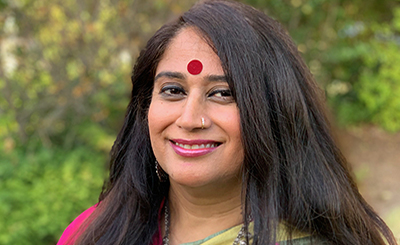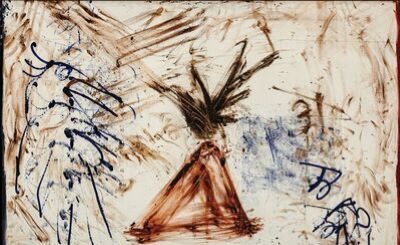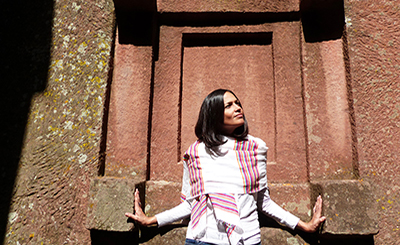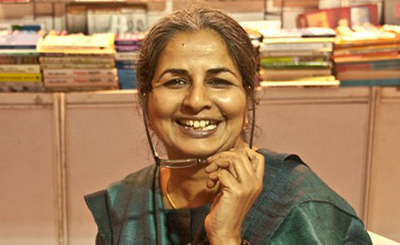
Tishani Doshi. Photo: Carlo Pizzati
The author of Small Days and Nights on the landscape in her novel, both of the beach as well as of the protagonist’s solitude; how she writes to find out the story, and her impulse as a writer to stare in the eye of the everyday violence that hums through human existence
Tishani Doshi’s latest novel, Small Days and Nights (Bloomsbury), is a quiet meditation on belonging, identity, isolation, homecoming and motherhood. It’s the story of a woman negotiating through the challenges of the everyday, and chronicles the minutiae of her precarious life as an outsider, a life that sees her constantly endeavouring to wrest a meaning out of her lived experiences. Grace, battered by a failing marriage, returns to Pondicherry to cremate her mother, where she discovers a sister she never she had. As Grace goes to carve a separate life with her sister Lucia, who was born with Down’s Syndrome, she finds herself torn between familial duty and individual freedom. Adopting a new way of life in a place that accentuates her otherness introduces her to new struggles and strains, a new form of isolation. Grace must navigate them to wish away her sense of dislocation and dysfunction.
Doshi, 43, says she wanted to explore the effects of solitude on a person. “For Grace — she’s in this isolation with a sister with whom communication is difficult, but also whom she is caring for — and that adds another layer to it,” she says. As a writer, she says, story is the thing she’s least interested in. “My impulse to write is not because I have a story to tell. It’s that without the words I can’t understand what I’m trying to say. So, I write to find out the story,” she says, adding that another of her impulse has been to try and look the everyday violence that hums through human existence in the eye — to name it and to refuse to let it have the last word.
Excerpts from an interview:
Shireen Quadri: In Small Days and Nights, you explore the larger realities (land grabs, environmental destruction, and the slow erosion of a way of life) of the coastal rural India — Paramankeni village in Tamil Nadu, where the story is set — through the “smallness” of nights and days. In the epigraph, there is a quote by James Salter: “It’s in the little towns that one discovers a country, in the kind of knowledge that comes from small days and nights.” Did you set out to give a sense of the macrocosm of a nation, or society, through the microcosm of a family?
Tishani Doshi: I don’t set out with clear objectives. I think at some point they emerge in the narrative as overarching themes. They are peripheral to the story at hand, which is the story of a woman and her sister in an isolated house on a beach in Tamil Nadu. So, I start with character, in this case, Grace, and a sense of trajectory. I wanted to write about that landscape because I’ve spent some time living on the Tamil Nadu coast — there’s a wildness to it, a richness, all the waterways, canals, aquifers, the ocean. To live in a landscape such as this, at a distance from the city, what does it mean? It’s a reverse journey in a way — so much of the movement we see in India is from village to city, and while there is much to investigate and celebrate in the bright lights big city narrative, I wanted to examine life on the margins of those throbbing pulsing centres.
Shireen Quadri: Grazia or Grace, who is at the centre of the narrative, is of half-Italian and half-Indian descent. In what ways does she spring from the duality you inhabit, the life you have lived and the worlds you have known?
Tishani Doshi: I was reading recently about how they discovered a two-headed rattle snake in New Jersey, which is fascinating, in the way that Siamese twins are fascinating, the way that ardhanarishvara is fascinating and the way that hybridity is fascinating. Hybridity is essentially an inbuilt duality, a two-bodied experience, where you can look in several directions simultaneously and feel dizzy and centred all at once. My interest in it isn’t simply because that has been my genetic and geographical experience of the world, but because I believe that hybridity will save us. I remember listening to Salman Rushdie rail against the idea of impurity some years ago at the Hay Festival, and that has always stayed with me, the danger of the pure race, the pure being, the pure state — and the importance of dirt. So, yes, I suppose this is the prism through which I’m looking, and to which I’m holding on to.
Shireen Quadri: What informs the choices Grace makes? What did you want to achieve through the descriptions of her life’s everydayness, the minutiae of her daily rigmarole, filled with loneliness and grief?
Tishani Doshi: I wanted to explore the effects of solitude on a person. Whenever I have stayed by myself for long periods of time, I find the state of myself, my actual body, to be quite different than when I’m “in the world”, so to speak. I start talking out loud to myself, I follow a different sleep cycle, all the daily tasks are attended to without witness, and somehow this is alienating but also occupies a different sense of time — a timeless time. For Grace — she’s in this isolation with a sister with whom communication is difficult, but also whom she is caring for — and that adds another layer to it. I suppose, I’m interested in life’s accretions. The washing of elbows, the chewing of food, the brushing of teeth… the repetitiveness of it, and how the monotony of all that is broken with unexpected shafts of beauty — an encounter with dolpins in the ocean, the electric blue of a kingfisher’s wings. These are in the novel, too, — a real attention to the beauty of the world they inhabit. And, of course, there is the howling with the dogs — something old and insistent that is a daily hymn of announcing we’re here, we’re still here, to the world.
Shireen Quadri: Grace’s identity is marked by a kind of dichotomy and hybridity. She is both an insider and an outsider. She belongs and yet she doesn’t. She is at home, and yet elsewhere. How did you work on this element of her character? Do you think her “foreignness” or “otherness” makes her feel more vulnerable or give her a sense of fragility?
Tishani Doshi: Possibly, but I also think there are people who naturally occupy peripheral places, who skate around the edges. Partly, I think it’s a character trait, where you get used to being the outsider, and that it suits you in some way to have this one foot, in other foot out syndrome. Commitment phobes, for example, change houses and lives and cities frequently. Restlessness is coded into human DNA. It feels to me more intuitive to be moving and nomadic rather than to settle and be still, but Grace has an idea that by laying down some roots, by tending to garden, dogs, sister, with all this nurturing, she will climb closer to herself. It’s a struggle. I imagine that most people have days when they feel that everything is right with the universe, that there is a synchronicity and all the waves are just pushing forward, and other days when you feel battered down and all is out of step. Grace feels all that too.
Shireen Quadri: Dogs, and their howling, as you mentioned earlier, is the ‘daily hymn’ and constitute a significant part of the women’s lives and daily chores. Did you have to consciously work on their presence in the novel?
Tishani Doshi: The dogs floated in pretty easily. Once dogs become a large part of your life it’s really difficult to exclude them from the narrative. I think particularly in this case, because of the isolation, the dogs are the only other living presence, while you may be unseen by the world, they see you, and because they are pariah dogs, they occupy this peripheral space of coming and going, between the domestic and the wild. So they are totems really, of loyalty, of protection, of the land itself.
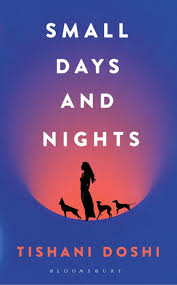
Shireen Quadri: The larger strand in your poetry, novels and performances has been a focus on the female body. How do you see the countries of bodies connecting to the wider world, to countries divided by geography? How crucial is this connection? What does this connection mean for the body, and for the world?
Tishani Doshi: The body is what we have and it so frequently feels disjointed. My work as a dancer has been to invest in the body — to take that body out onto a dark stage and begin — and, in some way, those years when I was intensely working with Chandralekha with my body, seem to be the time when I was most awake. I was seeking, I was open, I was transforming, I was full of possibilities. Not to say that I wasn’t riven with insecurities and that every day in the theatre I was reminded of my body’s limitations, but there is a pact with the body — and you become aware of how you move through the world, how you are perceived, how your body stacks up against other bodies, is privileged or not over other bodies, is endangered or not over other bodies, is triumphant, or not. Body is always a failure in some sense, it is the reminder of our mortality, but it’s also what we’ve got, and it has the capacity for gloriousity (I just made that word up) but it’s that. It’s a mixture of the spiritual and the sacred and the sensual, and it is our one chance for connection. To hold a hand, to step over a line, to embrace, to place skin against skin.
Shireen Quadri: Your latest poetry collection, Girls Are Coming Out of the Woods, as well as your latest novel, seem to have a resonance with the contemporary issues of violence against women, the dangers they face and the safety net they need to survive in a hostile world. Do you see both these books emanating from a singular state of anger at the way things are?
Tishani Doshi: I wrote both books over a period of a few years and I suppose I was quietly simmering and fuming that entire time, and continue to do so. Part of my frustration is that it seems to be a universally held idea that the human default is nonviolence. Of course, many people are quite peaceful but historically as a species we have been violent to each other and to the environment and to other animals. If we accepted this violence as part of our nature, perhaps we could counter it. So much violence is perpetuated by those vanguards of civilization — the church, educational institutions, the family. And I’m not even talking about wars and imperialism and slavery and the rest of it, but just everyday violence that hums through human existence — so as a writer, my impulse has been to try and look this violence in the eye — to name it and to refuse to let it have the last word.
Shireen Quadri: A certain kind of lyricism marks both your fiction and dance pieces. In what ways does your “loyalty” to poetry shape your creative energies and output?
Tishani Doshi: The thing I find most interesting about artists is their voice. For writers we have language, we have words and sentences, we have style, tone, aesthetic. We also have story I suppose, but story is the thing I’m least interested in as a writer. My impulse to write is not because I have a story to tell. It’s that without the words I can’t understand what I’m trying to say. So I write to find out the story. I think in that sense poetry has an inbuilt abstraction. From one image, an entire poem can spring. This can happen with the novel too, but its architecture requires way more scaffolding than a poem. With dance, the body is the voice — and there is the possibility of working in a narrative form, but also for terrific abstraction. And with both dance and writing — music is an important element. Ultimately, you want the work to sing.
Shireen Quadri: In an increasingly changing world where some countries are shutting their doors on migrants, will multitudes of identities and in-betweenness help things?
Tishani Doshi: You know, globalisation was supposed to bring us the Benetton world. That sense of mixing and miscegenation and We Are the World etc has taken us on a nice fairytale ride and brought us right back to Fascism. I think the circularity of these things, the divisive politics practised in most parts of the world now, and the failure of an essentially liberal progressive outlook that didn’t take into account the many people who feel disenfranchised and left out of the global love fest, prove that some people believing in multiplicity is not going to help. Legislation is always in danger of sliding backwards, rights once given are not enshrined, borders are more profound and disruptable than they were a hundred years ago. We also have fewer resources and climate-wise it feels as though things are reaching a tipping point, so I feel there is going to be more slamming of doors unfortunately.
Shireen Quadri: As a writer and an artiste, what do you make of the rising intolerance around the world and a growing fear of the “other”, as well as the resurgence of a divisive ideology that creates walls among people and stifle their identities?
Tishani Doshi: Identity has become such a cage. All the time, we are trying to escape boxes and compartmentalisation and then we are squeezed back in for some kind of census. We want to feel part of something but we also want to be free. We want to connect to that which binds, but we don’t want the rope to strangle us. It’s delicate. I always think of the ideal as the Venn diagram. Areas of intersection, areas of independence. I don’t know how to replicate that in life in a way that it feels equal for everyone.
More from The Byword
Comments
*Comments will be moderated



